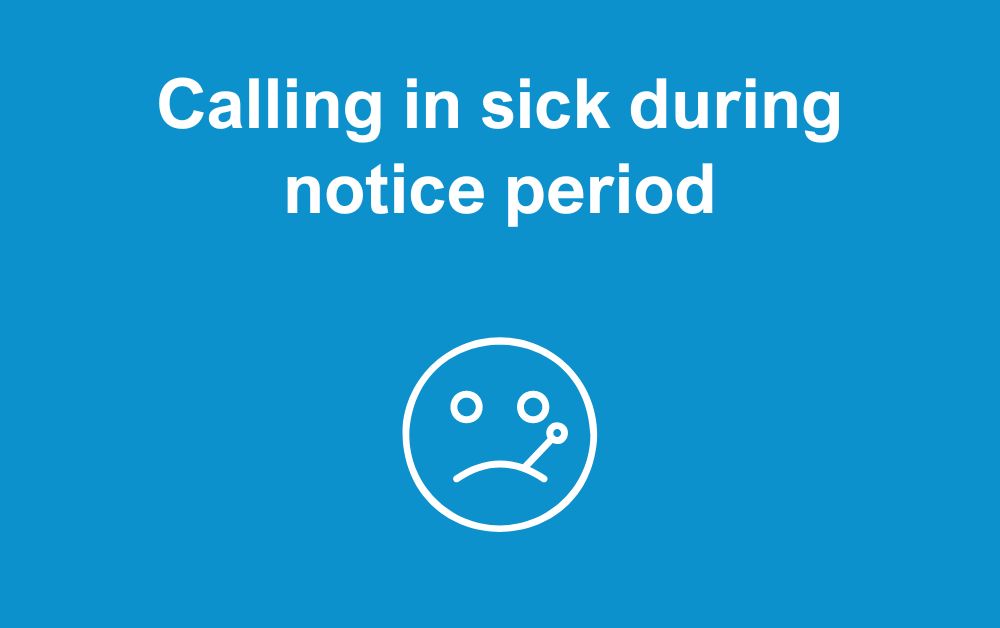What happens if you call in sick during your notice period?
When an employee hands in their notice, it signifies the beginning of a transition period for both the employee and the organisation.
Sick leave during notice period: For some, this can be a way to avoid their notice period, however some employees may be genuinely unwell. We understand as an employer this can be a difficult scenario to deal with as this period is an important time to hand over responsibilities. It’s important you deal with this correctly to avoid any issues in the future.
The rules governing sick leave during the notice period are clear, yet not everyone is familiar with them. This blog post aims to shed light on this topic, providing both employees and employers with the information they need to navigate these situations effectively.
Are employees able to take sick leave during their notice period?
Yes, employees are entitled to take sick leave during their notice period. They have the right to statutory sick pay and their holiday entitlement won’t be impacted.
If an employee falls sick during their notice period, they should follow the same procedure as they would at any other time, which typically involves notifying their employer as soon as possible. It’s crucial for employees to be aware that their right to sick leave and pay continues during the statutory notice period.
The length of the notice period itself, whether statutory or contractual, does not affect the employee’s right to SSP. However, if the sick leave extends beyond the notice period, SSP may stop once the employment officially ends.
Understanding Statutory Sick Pay (SSP)
In the UK, employees are entitled to Statutory Sick Pay (SSP) if they meet certain conditions. This includes:
- Be classed as an employee and have done some work for the employer
- earn an average of at least £123 per week
- have been ill for at least 4 days in a row (including non-working days)
SSP is payable for up to 28 weeks, and this entitlement does not change during the notice period. Employee’s will not qualify for SSP if:
- They have received the maximum amount of SSP
- are on statutory maternity pay
Enhanced Sick Pay During the Notice Period
The key question often revolves around pay. If an employee is eligible for SSP, they will receive this in lieu of their normal salary. However, some employment contracts include enhanced sick pay terms, which could mean the employee receives their full salary for a certain period of sick leave. It’s important for you to review the employment contract terms to understand the entitlements.
Employer Responsibilities
For employers, it’s essential to handle such situations with sensitivity and adherence to legal standards. You should ensure that your policies on medical leave and notice periods are clearly communicated and applied consistently. You must also be mindful of the broader implications, including the potential impact on workload and team morale, and plan accordingly.
Employers cannot dismiss an employee for taking sick days during their notice period, as this could be deemed unfair dismissal. However, if there are concerns about the genuineness of the health condition, you are entitled to request evidence, such as a fit note from a doctor if the absence is for more than seven days.
Do employees have to provide a fit note?
Employees are not required to provide a sick note until 7 days have gone by (including non-working days). In addition, if their notice period ends before this, they won’t have to hand in a fit note. If the notice period is longer than the 7 days, they will have to provide you with this. Failure to do so can lead to an unauthorised absence. Staff must get their fit note from:
- GP or hospital doctor
- Occupational therapist
- registered nurse
- Physiotherapist
- pharmacist
This can be printed or provided digitally.
Navigating Complex Scenarios
Situations can become more complex if the employee has a long notice period or if there are ongoing health issues. In such cases, open communication and flexibility can be crucial. Employers may need to consider adjustments or support for the employee’s return to work, even if it’s for a short period before their departure.
In Conclusion
Sickness during the notice period is a scenario that requires careful handling, respecting both the employee’s rights and the employer’s needs. By understanding the legal entitlements and maintaining open lines of communication, both parties can navigate these situations more smoothly. It’s about striking the right balance between compassion and practicality, ensuring a respectful and dignified end to the employment relationship.
If you have any further questions on what happens if you call in sick during notice period uk or if you are in need of any guidance from our HR Consultants, contact us.







